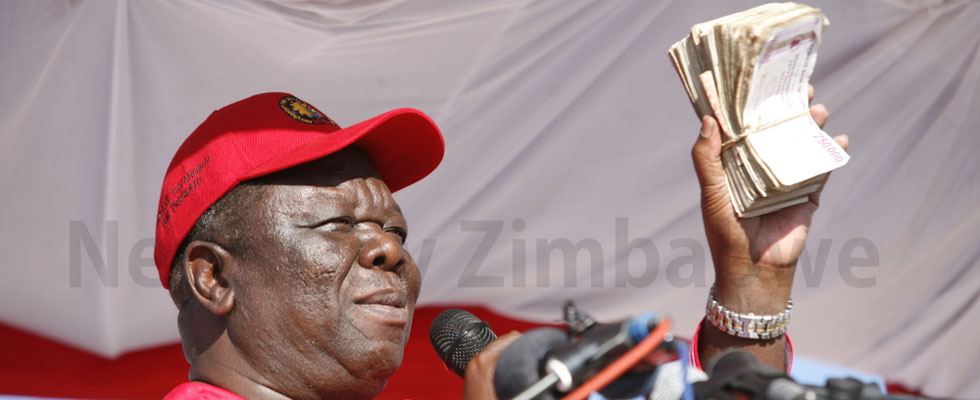
PLANS by the MDC-T to “disengage” from national institutions such as Parliament in protest against the alleged rigging of the July 31 elections may prove costly and leave the party weaker, analysts have warned.
BY PATRICE MAKOVA
The party’s national council recently resolved that the party’s legislators would withdraw from Parliament in solidarity with losing candidates.
A resurgent Zanu PF secured a shock two thirds majority in Parliament, reversing its 2008 loss to the MDC-T.
While the MDC-T has approached the courts to reverse the polls, some within the party are blaming the leadership for complacency, lack of focus and taking people for granted.
Analysts said boycotting Parliament was not in the best interest of the MDC-T considering that Zanu PF would not be moved by such an action.
Oxford University lecturer, Phillan Zamchiya said participating in the legislature would ensure that the MDC-T remained in the corridors of power, providing the party a platform for “intelligence gathering”.
“If they [Zanu PF] make bills, whether draconian or not, the MDC-T will have an opportunity to gather intelligence and take appropriate action,” he said.
- Chamisa under fire over US$120K donation
- Mavhunga puts DeMbare into Chibuku quarterfinals
- Pension funds bet on Cabora Bassa oilfields
- Councils defy govt fire tender directive
Keep Reading
Zamchiya said Parliament provided a formal communication channel for legislators outside the party, with MPs able to reach out to their constituents via this institution.
He said by participating in parliamentary business, the MDC-T would avoid a possible split as some elected MPs might defy the directive to disengage.
Zamchiya said once emotions over the shock results died down, “personal political economy” would be key determinant for individuals when deciding whether to join Parliament or not.
He said personal political economy was all about survival for the elected individuals.
“They need rentals, a salary and vehicles,” said Zamchiya. “Some of them used a lot of money during the campaigns but the party will not be in a position to fund them. It is very difficult for the opposition to get financial resources outside Parliament.”
Zamchiya said by boycotting Parliament, the MDC-T would kiss goodbye to funding provided under the Political Parties Finance Act.
Only parties in Parliament are eligible to benefit from funding provided under the Act.
Zamchiya said if the MDC-T MPs failed to go to the august house within the stipulated period, the seats would be declared vacant, compelling President Robert Mugabe to call for by-elections.
“Some opposition parties will emerge and field candidates,” he said.
Crisis in Zimbabwe Coalition (CiZC) director, Macdonald Lewanika said given the futility of any attempt to reverse the election outcome, it was time to quickly accept the reality and think of the bigger picture which involved keeping the Zanu PF government in check.
“This means quickly accepting that to some extent, ‘all is fair in love and war’,” he said. “It might mean accepting the crushing defeat and taking up positions on what is left of the battleground while trying to safeguard what was fought hard for in the past four years, as well as the political positions retained at election.”
Lewanika said Zanu PF had already shown that it was not hesitant to take up “dramatic and high-risk actions that move them ahead while everyone watches in consternation and shock”.
He said if the elected local government officials failed to take up their positions in councils as part of disengagement, soon Harare would have a Zanu PF mayor with the city and other towns being “apportioned” to Zanu PF bigwigs.
Lewanika said if elected MPs boycott Parliament, a speaker would soon be elected and legislation pushed through that may be retrogressive while everyone else would be wasting time “shouting hoarse from the side-lines”.
“New institutions occasioned by the new Constitution will be set up with people crying foul in spaces where the noise will not make a difference,” he said. “The economy will be cut up into nice neat portions, which will be fed to loyal Zanu PF clients as part of their patronage system under the guise of empowerment and indigenisation.”
Another political analyst, Gladys Hlatywayo said the fact that the party deputy chairperson Morgan Komichi had been denied bail and remained in prison on allegations of violating the Electoral Act, made it pointless to engage in institutions such as Parliament.
“All is not well and there is no reason to engage at all. They must however couple disengagement with other strategies on the ground for sustainability,” she said.
But Clerk of Parliament, Austin Zvoma has already said the mulled MDC-T boycott would not impact on the business of the eighth Parliament. He said Zanu PF’s overwhelming majority was well above the quorum of 25 required in the 270 member National Assembly.
Disengagement is the best option — analyst
Political analyst, Gladys Hlatywayo is of the view that it made no sense for the MDC-T to get into a Parliament where Zanu PF has a two thirds majority as the party would not make any meaningful impact.
“Moreover, the MDC-T has boldly said the election is null and void hence should disengage from anything associated with that election,” said Hlatywayo.
She however, acknowledged that some of those who won were calling for engagement fearing a boycott threatened unity in the party.
This was in view of the events in 2005 when the MDC split into two due to disagreements over participation in senatorial elections.
Hlatywayo said those who wanted to engage and were citing their constituencies as their basis were being insincere.
“The truth of the matter is that they are being motivated by personal survival at the expense of the broader objective,” she said. “This election was flawed and MDC must not legitimise fraud. MDC must send a clear signal to Zanu PF, the region and international community that the election was stolen.”











